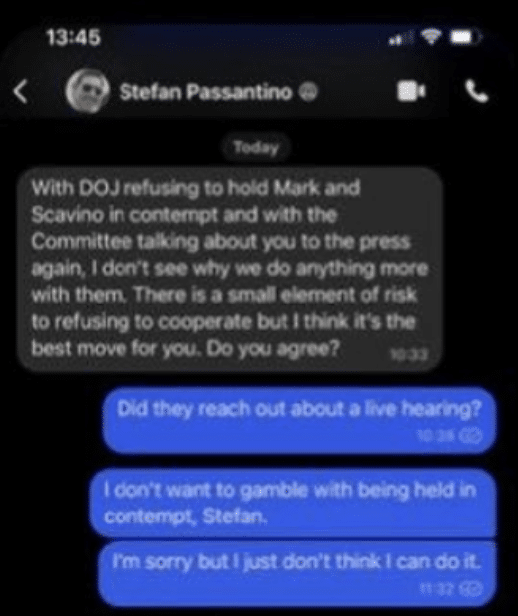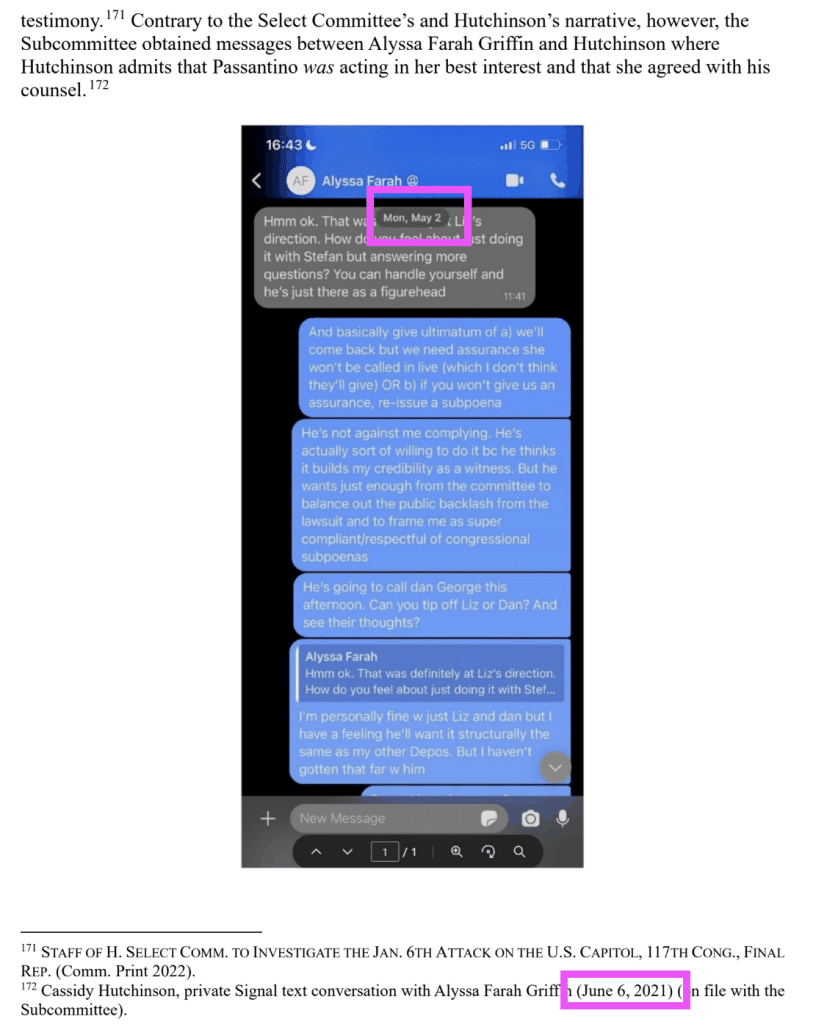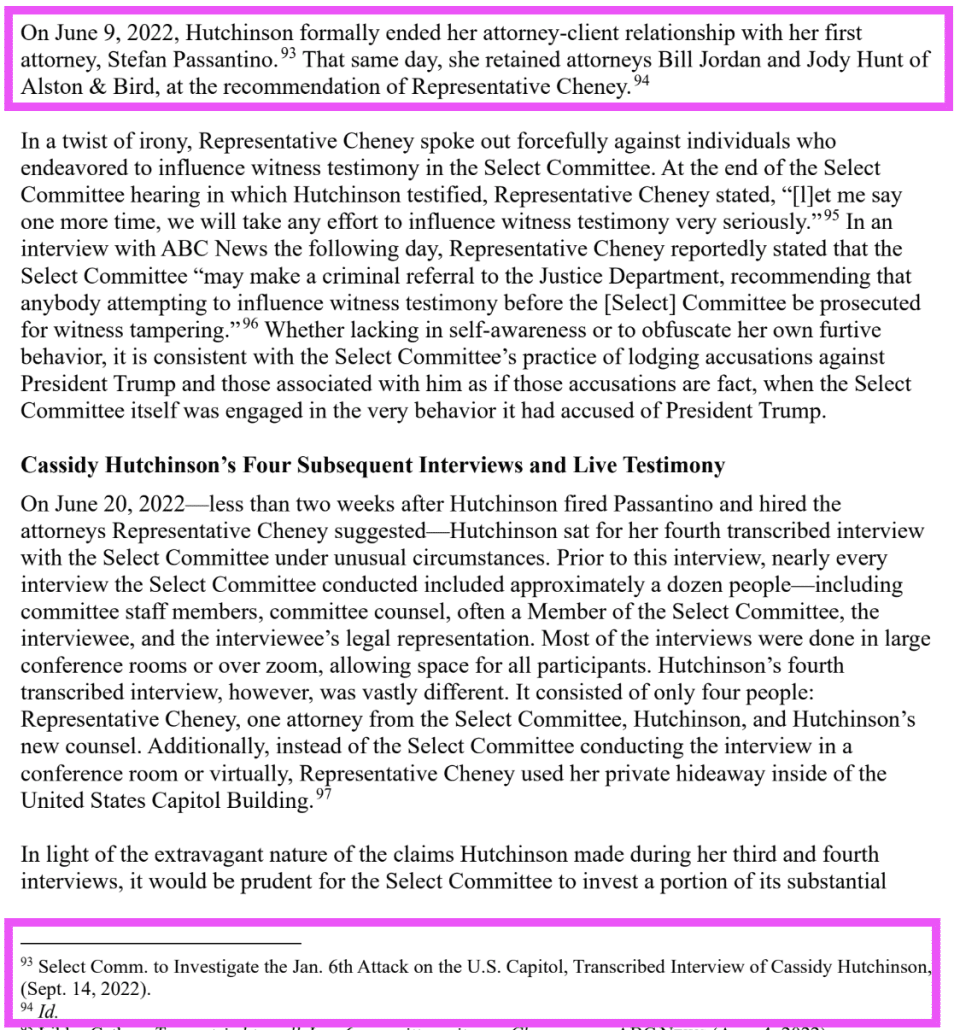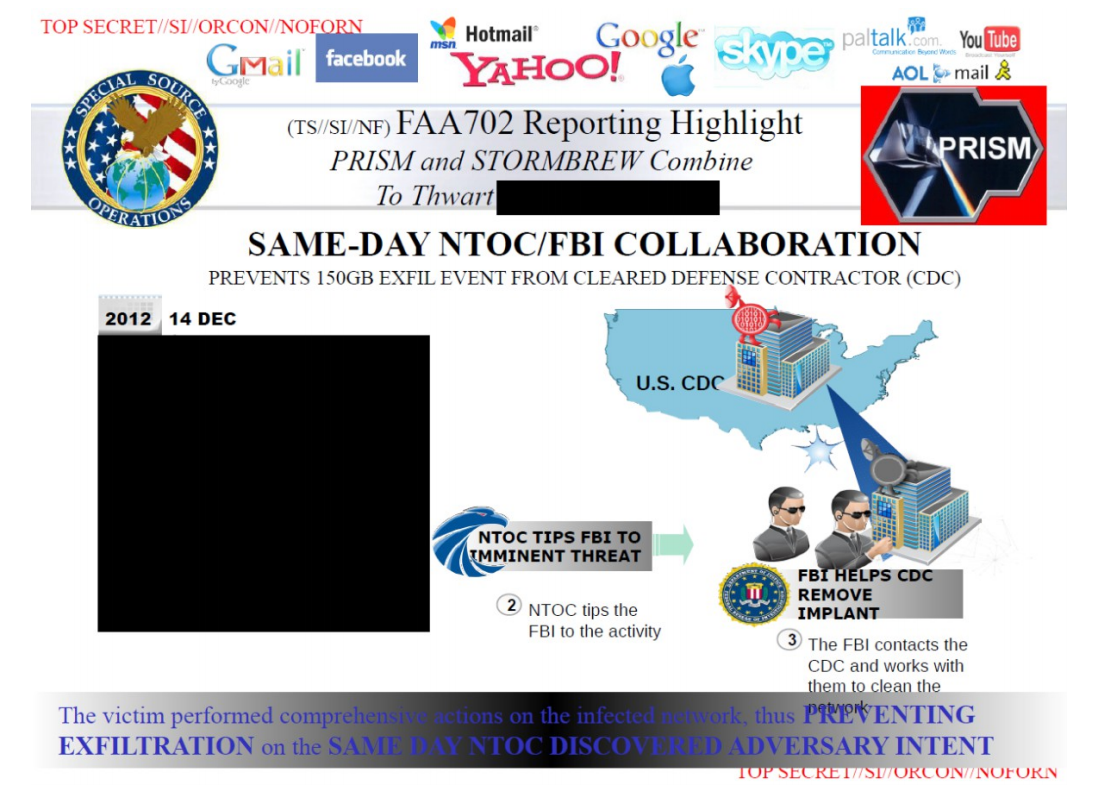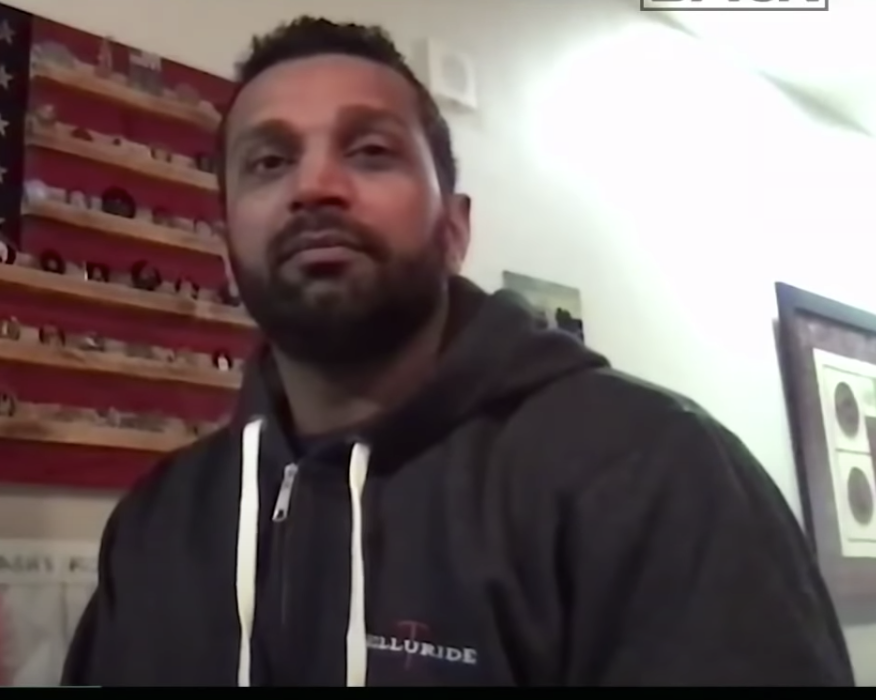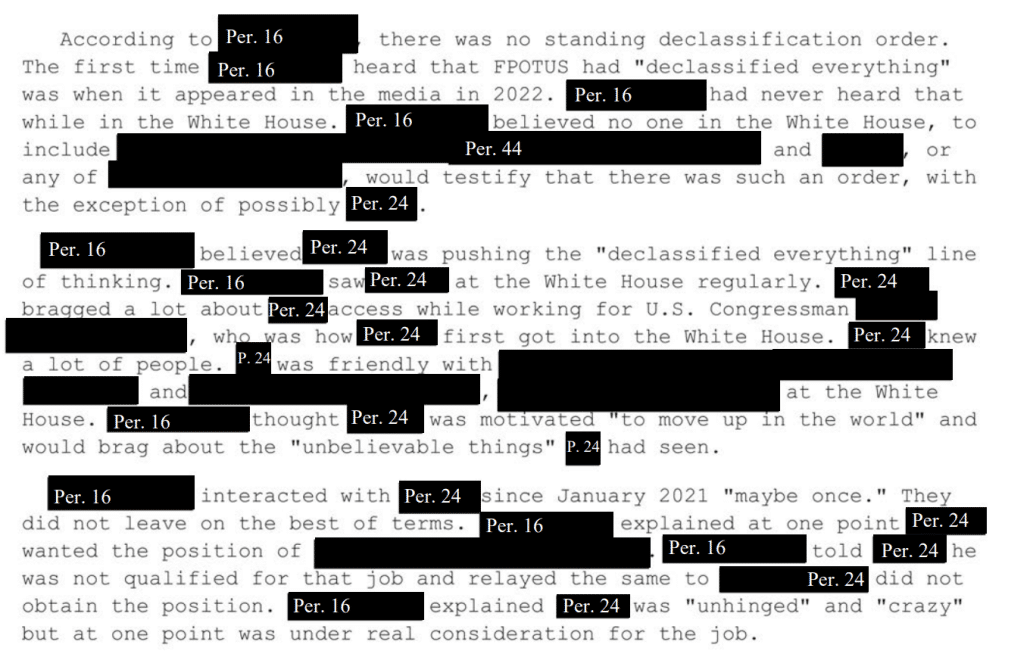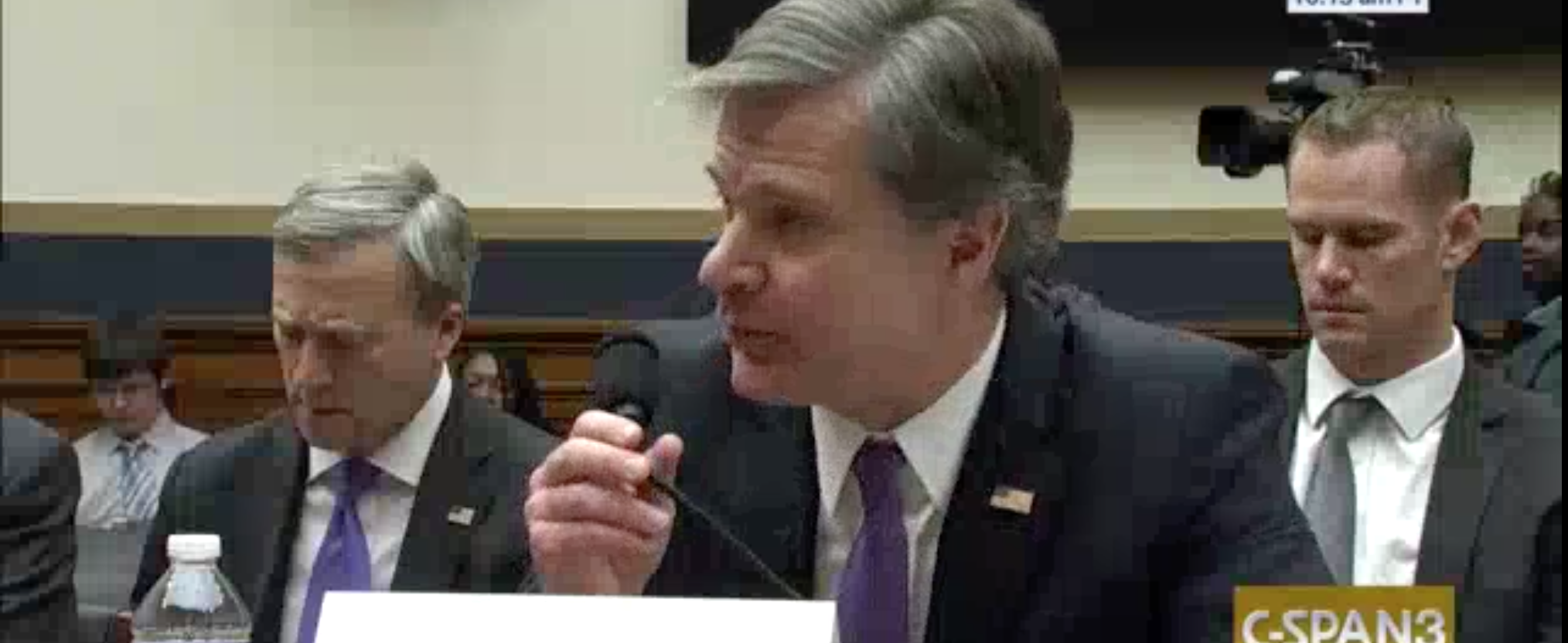“Friendly to Us:” NYT Buries Its Own Role in Trump’s Attacks on Rule of Law
There comes a time in almost every Trump legal scandal where evidence comes out that Trump insiders believe they manipulated Maggie Haberman to serve Trump’s interests.
Evidence that both Roger Stone and Rick Gates used Maggie for various purposes came out in the Mueller investigation files, as when Gates claimed leaking Trump’s foreign policy speech to Maggie was a way to share it with Stone.
At Trump’s NY trial, Michael Cohen described how he deliberately misled Maggie about the nature of the payments he made to Stormy Daniels.
Perhaps the most damning example came in Cassidy Hutchinson’s testimony, where she described how, after her last appearance before the January 6 Committee while still represented by Stefan Passantino, he took a call from Maggie and confirmed that Hutchinson had just finished testifying to the committee.
His phone is ringing.
I look down at his phone. It’s Maggie Haberman calling him. And I looked at Stefan, and I said, “Stefan, did you tell Maggie Haberman that we were meeting with the committee today?”
And he’s like, “No, no. Maybe that’s not what she’s calling me about.”
And I said, “Stefan, did you tell Maggie that we were meeting with the committee today?
And he said, “No, no, but I should probably answer to see if she knows, right? I should answer.”
And said, “Stefan, no. I don’t think you should answer that call. She probably wants to know if we met with the committee today.”
He said, “Cass, I’m just going to answer. It will just be 2 seconds. I just want to find out what she’s going to talk to me about.”
He answers.
I can’t hear what she’s saying, but I hear Stefan say, “Yeah, yeah, we did just leave her third interview. You can put it out, but don’t don’t – don’t – don’t make it too big of a deal. I don’t think she’ll want it to be too big of a deal. All right. Thanks.”
And I said, “Stefan, was that Maggie Haberman asking about my interview?”
And he said, “Yeah, but don’t worry. She’s not going to make it a big deal.”
I said, “Stefan, I don’t want this out there.”
He said, “Don’t worry. Like, Maggie’s friendly to us. We’ll be fine.”
So I was just like, “Whatever.” I was annoyed.
Hutchinson went on to describe how, even as Passantino was discouraging Hutchinson from reviewing documents in a SCIF that would allow a follow-up appearance, Passantino and Alex Cannon spent the weekend talking to Maggie about Hutchinson’s testimony.
So I reached out to him on Monday, May 23rd: “Has [redacted] reached out about the SCIF?”
And then he was just kind of being wishy-washy with it.
He also let me know on that phone conversation that Maggie Haberman, quote, “got a story from the committee about my third interview,” end quote, and he spent he, Stefan, spent the whole weekend with Alex Cannon convincing Maggie Haberman not to publish the story that she got from the committee about my third interview.
Hutchinson described her particular disinterest in sharing her story with Maggie (and Josh Dawsey, another Trump whisperer).
And s0 now we’re moving into the phase of you know, I did my best throughout this whole period — I don’ like talking to reporters. Reporters would text me during this period. Ninety-nine percent of reporter texts always go unresponded to. I don’t like talking to reporters. I think there are some that I have, like, a friendship/working relationship with that I knew from being on the Hill and at the White House, but, like, Josh [Dawsey], Maggie Haberman, all those people, I stay very clear from.
But Josh [Dawsey], for example, had started reaching out to me and saying that he heard that the committee was in talks with Stefan about bringing me in for a SCIF interview and a live testimony; where did I stand on that with Stefan?
Say what you will about Maggie’s role in all this: Assuming it was her on Passantino’s phone (Hutchinson does not name the journalist in her book), she was just chasing a big story.
But there’s no doubt that one source of Hutchinson’s distrust of Passantino in the period leading up to her decision to get new lawyers stemmed from his willingness to share details of her testimony with Maggie — at least as she portrayed it — against her wishes.
“I don’t think you should answer that call,” Hutchinson said.
“Don’t worry,” the attorney representing Hutchinson but paid by a Trump entity said. “Like, Maggie’s friendly to us. We’ll be fine.”
None of that shows up in NYT’s faux savvy review of the game behind Barry Loudermilk’s referral of Liz Cheney for criminal investigation for allegedly intervening in Hutchinson’s legal representation at the time. NYT doesn’t bother to disclose to readers that, as Hutchinson described it, Maggie — who is bylined — played as significant a role in the breakup of the relationship between Passantino and Hutchinson as Cheney did.
Having failed to disclose Maggie’s alleged role in all that, here’s how — starting 28¶¶ in — NYT ultimately describes Loudermilk’s report and the claims within it.
The House report on Ms. Cheney, prepared by a Republican-led subcommittee on oversight, was specifically focused on the former representative, who broke with her G.O.P. colleagues over their ongoing support of Mr. Trump in 2021. But she has also infuriated Mr. Trump not only because she helped to lead the congressional investigation into him, but because she crossed party lines in the election and campaigned against him in support of Ms. Harris.
The report claimed that Ms. Cheney may have violated “numerous federal laws” by secretly communicating with Cassidy Hutchinson, a star witness for the Jan. 6 committee, without the knowledge of Ms. Hutchinson’s lawyer.
When Ms. Hutchinson was first approached to provide testimony to the committee, she was represented by a lawyer who had once worked in the Trump administration’s White House Counsel’s Office.
After meeting with Ms. Cheney, she hired a different lawyer and her subsequent public testimony was damaging to Mr. Trump. It included allegations that he had been warned his supporters were carrying weapons on Jan. 6, but expressed no concern because they were not a threat to him.
The report asked the F.B.I. to investigate whether Ms. Cheney’s dealings with Ms. Hutchinson were carried out in violation of a federal obstruction statute that prohibits tampering with witnesses. The report also accused Ms. Hutchinson of lying under oath to the committee several times and suggested that investigators examine whether Ms. Cheney had played any role in “procuring another person to commit perjury.” [my emphasis]
There’s a lot that’s misleading in this description. As I’ve noted, the section of the report describing DOD’s failures is actually longer (39 pages as compared to 36) than the section on Cheney and Hutchinson. Particularly given Loudermilk’s silence about Kash Patel’s role in what Loudermilk claims was DOD misconduct, to claim the report was “specifically focused” on Cheney is particularly misleading.
Maggie, writing with Alan Feuer, takes as proven the timeline Loudermilk lays out, which overstates what the evidence shows. While Cheney did communicate directly with Hutchinson, that was in June 2022, hours after Passantino had advised Hutchinson to take the “small element of risk to refus[e] to cooperate” with the committee any further in light of DOJ’s declination to press contempt charges against Mark Meadows. Hutchinson initiated the communication with Cheney and did so because, as she told Passantino, “I don’t want to gamble with being held in contempt.”
NYT asserts that what was damning about Hutchinson’s testimony after she ditched Passantino was Trump’s knowledge that people were refusing to go through magnetometers, but he wasn’t concerned because they wouldn’t hurt him. Hutchinson did tell that story publicly on June 28, 2022 (and J6C played earlier video testimony she had provided). But that thread of testimony started in her first interview in February 2022 and continued in her May 2022 interview, both of which Passantino attended. It all stemmed from texts she exchanged with Tony Ornato (texts that also make clear Trump “kept mentioning [a trip to the Capitol] before he took the stage” to give his speech).
To the extent this is among the things Loudermilk claimed Hutchinson lied about, Loudermilk’s case is based on word games, conflating formal intelligence with notice from Secret Service manning the rally that rally goers had (at least) flagpoles that were triggering the mags, misrepresenting a conversation Hutchinson claims she and Tony Ornato had with Mark Meadows, and ignoring that one of Ornato’s denials amounted to a claim he didn’t remember.
Plus, Hutchinson always emphasized that Trump’s concern was “get[ting] the shot,” packing enough bodies into the audience to make it look crowded, and not about ensuring that his supporters could keep their weapons before they marched to the Capitol. The claim that Trump knew his supporters were armed was legally damaging; it meant he knew the risk when he riled them up further about Mike Pence. But that’s not how Hutchinson spun it and it was testimony rooted in what she said in Passantino’s presence.
A reader might expect some assessment of Loudermilk’s claims in an article that boasts, as the headline of this does, that “Republicans Map a Case Against Liz Cheney.” No they didn’t. They floated a number of flimsy claims that don’t amount to a crime. You’re reporters. Act like it. Make that clear (as Philip Bump did here), rather than pretending Loudermilk’s claims aren’t mere whitewash.
The report neither links nor shows much understanding of the report itself. Even where it quotes lawyers about the viability of the charges, it doesn’t mention (for example) that the Jack Smith investigation resulted in a new Speech and Debate opinion that would apply to Cheney’s actions.
The real sin with the four-paragraph description of Loudermilk’s case, however, is one closely tied to Maggie’s own undisclosed role in it. NYT claims that Passantino was merely a former Trump White House Counsel. That’s not the issue. The issue, which goes to the core of the dispute and the reason Hutchinson replaced him, is that he was paid by entities associated with Trump, and Hutchinson came to believe he represented Trump’s interests over her own.
Loudermilk packages up as a crime actions Cheney took to give Hutchinson confidence her attorney was representing her interests, not Trump’s. Loudermilk packages up as a crime Hutchinson’s effort to avoid what even Passantino depicted as a risk of a contempt referral.
When Passantino told Hutchinson that it was okay for him to share information against her wishes because, “Maggie’s friendly to us,” was he also expecting that Maggie might misrepresent his role in all this (and leave his name unmentioned)?
That’s why you disclose such things.
The rest of this column (NYT bills it as analysis and claims the reporters who wrote it have “deep experience in the subject,” which is one way you might describe involvement in the story you’re telling) focuses on describing how delivering this report after Trump’s public demands, “reliev[es] Mr. Trump of the potentially fraught step of explicitly ordering the inquiry himself.”
A “friendly to us” reporter treats Trump’s word games as if they absolve him of responsibility.
¶¶4-14 describe Trump’s contradictory claims, including an uncorrected quote from Trump’s spox that “the nation’s ‘system of justice must be fixed and due process must be restored for all Americans.'”
¶¶15-23 describe Trump’s efforts to gin up investigations into his adversaries in his first term and going forward. The section includes multiple grossly misleading claims. First, it falsely insinuates that Trump never got the investigation of Hillary he demanded.
During his first presidential campaign, he often joined crowds at his rallies in chanting, “Lock her up!” — a reference to his opponent Hillary Clinton, whom he and other Republicans believed should have been investigated for using a private email server while she was secretary of state. After he won that election, however, Mr. Trump appeared to soften his stance, telling The New York Times editorial board that he did not want to “hurt the Clintons.”
But Mr. Trump, facing a special counsel investigation of his own, changed his mind again in 2018, telling his White House counsel that he wanted to order the Justice Department to investigate Mrs. Clinton.
[snip]
While the White House counsel ultimately declined to approve his plans to investigate Mrs. Clinton, Mr. Trump made clear on social media during his years in office that he believed various people should be prosecuted.
NYT simply ignores the Clinton Foundation investigation predicated in significant part on Bannon-associated oppo research that (as NYT reported) continued throughout Trump’s first term.
More problematic, given the suggestion that someone stopped Trump from getting a Special Counsel investigation into Hillary, it ignores that Special Counsel John Durham not only insinuated two false statement indictments against people associated with Hillary — both of which ended in acquittal — were conspiracies, but fabricated a claim about Hillary to which he dedicated an 18-page section in his final report.
NYT goes onto to — again — falsely suggest that Trump never got a special counsel investigation into Joe Biden.
Mr. Trump has called for Jack Smith, the special counsel who brought two criminal cases against him last year, to be “thrown out of the country.” And after he was arraigned on the first of Mr. Smith’s indictments, he said that, as president, he would appoint “a real special prosecutor” to “go after” President Biden and his family. (He has since backed away from his position on specifically investigating the Bidens.)
NYT’s “friendly” journalists would have you to believe they are ignorant that:
- Trump extorted Ukraine for dirt on Hunter and Joe Biden
- During Trump’s first impeachment, his personal attorney solicited such dirt from known Russian agents
- Bill Barr set up a side channel via which Rudy could share that dirt obtained from Russian agents and others
- Somehow, an FBI informant willing to frame Joe Biden came to share a claim that Mykola Zlochevsky bribed Biden that got laundered to the Biden investigation via that side channel
- Trump spoke directly to both Barr and Jeffrey Rosen about the investigation into the Bidens
- After David Weiss announced a plea deal with Hunter Biden, Trump attacked Weiss, contributing to threats against Weiss’ family
- After Barr made public representations about the false bribery allegation, Weiss reneged on Hunter’s plea deal and obtained Special Counsel status and chased the bribery allegation, only to discover it was false
Trump already got his Special Counsel to investigate Joe Biden, and just in time for election season. And while it flopped when Weiss discovered Scott Brady’s vetting failed to find obvious problems with the bribery claim, it nevertheless led to felony charges against Hunter and a humiliating trial in June.
Suggesting Trump didn’t get a Special Counsel to investigate the Bidens is propaganda, just as suggesting he didn’t get one to pursue Hillary is.
But I guess that’s what Trump’s people know they’ll get when they work with a journalist “friendly to us.”



